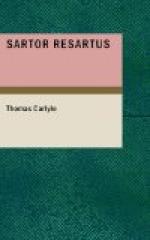By which last wire-drawn similitude does Teufelsdrockh mean no more than that young men find obstacles in what we call “getting under way”? “Not what I Have,” continues he, “but what I Do is my Kingdom. To each is given a certain inward Talent, a certain outward Environment of Fortune; to each, by wisest combination of these two, a certain maximum of Capability. But the hardest problem were ever this first: To find by study of yourself, and of the ground you stand on, what your combined inward and outward Capability specially is. For, alas, our young soul is all budding with Capabilities, and we see not yet which is the main and true one. Always too the new man is in a new time, under new conditions; his course can be the fac-simile of no prior one, but is by its nature original. And then how seldom will the outward Capability fit the inward: though talented wonderfully enough, we are poor, unfriended, dyspeptical, bashful; nay what is worse than all, we are foolish. Thus, in a whole imbroglio of Capabilities, we go stupidly groping about, to grope which is ours, and often clutch the wrong one: in this mad work must several years of our small term be spent, till the purblind Youth, by practice, acquire notions of distance, and become a seeing Man. Nay, many so spend their whole term, and in ever-new expectation, ever-new disappointment, shift from enterprise to enterprise, and from side to side: till at length, as exasperated striplings of threescore-and-ten, they shift into their last enterprise, that of getting buried.
“Such, since the most of us are too ophthalmic, would be the general fate; were it not that one thing saves us: our Hunger. For on this ground, as the prompt nature of Hunger is well known, must a prompt choice be made: hence have we, with wise foresight, Indentures and Apprenticeships for our irrational young; whereby, in due season, the vague universality of a Man shall find himself ready-moulded into a specific Craftsman; and so thenceforth work, with much or with little waste of Capability as it may be; yet not with the worst waste, that of time. Nay even in matters spiritual, since the spiritual artist too is born blind, and does not, like certain other creatures, receive sight in nine days, but far later, sometimes never,—is it not well that there should be what we call Professions, or Bread-studies (Brodzwecke), preappointed us? Here, circling like the gin-horse, for whom partial or total blindness is no evil, the Bread-artist can travel contentedly round and round, still fancying that it is forward and forward; and realize much: for himself victual; for the world an additional horse’s power in the grand corn-mill or hemp-mill of Economic Society. For me too had such a leading-string been provided; only that it proved a neck-halter, and had nigh throttled me, till I broke it off. Then, in the words of Ancient Pistol, did the world generally become mine oyster, which I, by strength or cunning, was to open, as I would and could. Almost had I deceased (fast war ich umgekommen), so obstinately did it continue shut.”




